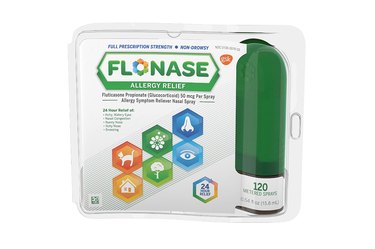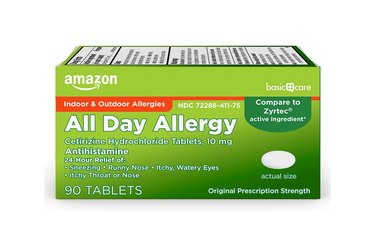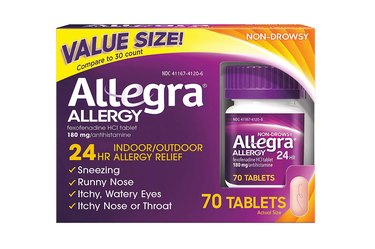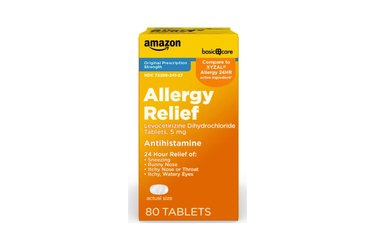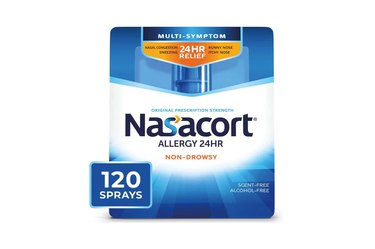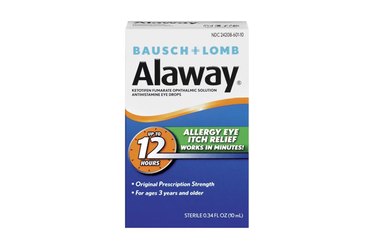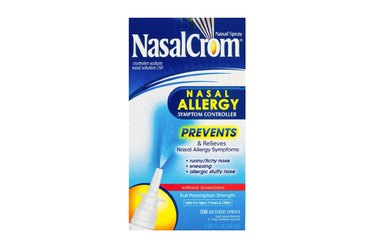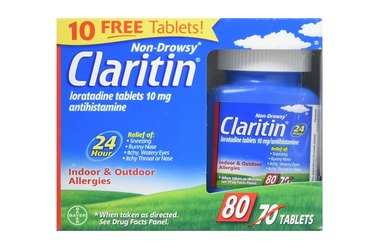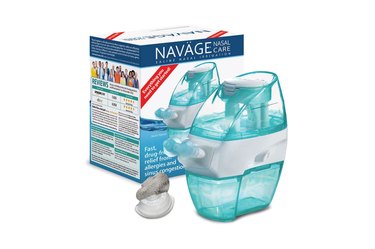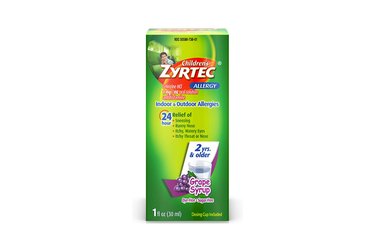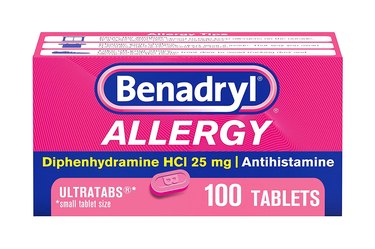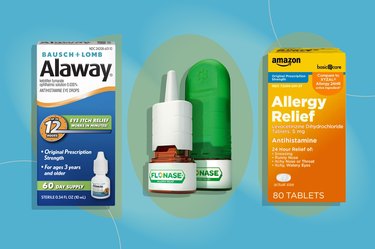
It's allergy season, which means that on top of your uncomfortable symptoms, people are probably shooting you dirty looks if you're in public sniffling and sneezing.
Seasonal allergies can bring itchy eyes and throat, cough and a runny nose, according to the American College of Allergy, Asthma, and Immunology — never a good look pre- or post-pandemic.
Video of the Day
Video of the Day
But the good news is that some of the best over-the-counter (OTC) allergy medicines can help, which is why we've rounded up the top picks to help you cope with your symptoms.
The Best Over-the-Counter Allergy Medicines
- Best Overall: Flonase ($21, Amazon)
- Best Prescription-Strength: Amazon Basic Care All Day Allergy ($12.17, Amazon)
- Best Non-Drowsy: Allegra (Amazon, $26.80)
- Best One-a-Day: Amazon Basic Care Levocetirizine Dihydrochloride Tablets ($24.55, Amazon)
- Best Nasal Spray: Nasacort AQ ($14.23, Amazon)
- Best Eye Drops: Bausch & Lomb Alaway Eye Itch Relief Drops ($15.99, Walgreens)
- Best for Pollen Allergies: NasalCrom Nasal Spray ($22.79, CVS)
- Best for Pet Allergies: Claritin ($25.50, Amazon)
- Best Natural: Navage Nasal Irrigation ($99.88, Amazon)
- Best for Kids: Zyrtec 24 Hr Children's Allergy Syrup ($8.63, Walmart)
- Best for Nighttime: Benadryl Allergy Ultra Tabs ($9.60, Amazon)
How We Chose
We talked to Anjeli Kalra, MD, allergist at UCHealth and assistant professor of medicine in the Division of Allergy & Clinical Immunology at University of Colorado Hospital, for her insight on the best OTC allergy medicines on the market.
These picks also include various delivery methods (pills vs. sprays, for example) and address a range of common allergies so that there's an option for you no matter your symptoms or preferences.
For more information on how we choose and cover products, click here.
Warning
All of the following medications and dosages are only recommended for adults 18 and older, unless otherwise noted. No matter your age, you should always talk to your doctor before taking any medication.
1. Best Overall: Flonase
In general, Dr. Kalra says first-line therapy for allergic rhinitis — the general term for symptoms caused by environmental and seasonal allergies — is an intranasal (in-the-nose) corticosteroid, such as Flonase, Nasacort or Rhinocort.
Flonase is made with the most-prescribed active ingredient, so it's a go-to remedy for relieving a lot of common allergy symptoms, including runny and itchy nose, sneezing, itchy eyes and nasal congestion. It's a 24-hour, non-drowsy medicine and effective for seasonal, year-round and indoor and outdoor allergies. You can use Flonase once or twice a day by spraying it in each nostril.
While Flonase is a good option for many people, Dr. Kalra says the best allergy medicine for you depends on your symptoms and any underlying medical conditions, so it's always best to speak to your doctor first.
2. Best Prescription-Strength: Amazon Basic Care All Day Allergy
Touted as original prescription strength, Amazon's Basic Care All Day Allergy is a non-drowsy antihistamine tablet for indoor and outdoor allergy symptoms. The main active ingredient, cetirizine hydrochloride, is the same as the one in Zyrtec. These 10-milligram tablets are gluten-free and effective for 24 hours.
Keep in mind that, as with prescription drugs, some of these strongest OTC allergy medicines come with a risk of side effects, Dr. Kalra says. For meds made with cetirizine, these include dry mouth, tiredness, stomach pain, diarrhea and vomiting, per the U.S. National Library of Medicine.
These meds also aren't right for everyone. Anyone with a history of eye disease or underlying uncontrolled conditions, such as diabetes, should be especially cautious about starting an OTC medication without discussing it with their doctor, Dr. Kalra says.
Buy it: Amazon; Price: $12.17 for 90 tablets
3. Best Non-Drowsy: Allegra
All selective histamine blockers (like Zyrtec, Claritin and Allegra) are non-drowsy. So, if you want a non-drowsy option you can take during the day, you can look for any non-sedating oral antihistamine, Dr. Kalra says.
(Note: Any antihistamine can cause drowsiness in really high doses, so make sure you are taking it as prescribed or as written on the label.)
The antihistamine in Allegra acts for 24 hours and takes about an hour to kick in. It helps provide relief from sneezing, runny nose, itchy throat and watery and itchy eyes.
If you're looking to avoid drowsiness, steer clear of Benadryl (diphenhydramine) and Chlor-Trimeton (chlorphenamine), Dr. Kalra says.
4. Best One-a-Day: Amazon Basic Care Levocetirizine Dihydrochloride Tablets
All non-drowsy allergy medications are taken once per day. For a basic, once-a-day allergy pill that will get the job done, consider this pick from Amazon's Basic Care line. The active ingredient levocetirizine dihydrochloride is a non-drowsy antihistamine that's also used in XYZAL Allergy 24HR.
Similar to other oral antihistamines, this medicine will start taking effect in about one hour and lasts for 24 hours. The dosage is 5 milligrams and these tablets are gluten-free and effective for upper respiratory symptoms such as sneezing, watery and itchy eyes and runny nose.
Buy it: Amazon; Price: $22.15 for 80 tablets
5. Best Nasal Spray: Nasacort AQ
Nasacort AQ is a steroid nasal spray, similar to Flonase but with a different active ingredient (triamcinolone vs. fluticasone, respectively).
The most important thing to keep in mind when using these sprays, Dr. Kalra says, is that they should be used on a regular basis to be most effective allergy medicines they can be. They don't work as well when they're used "as needed." The recommended dosing for people over 18 is one spray in each nostril twice daily or two sprays in each nostril once daily.
The technique you use is incredibly important to help cut down on irritation and up the effectiveness, she adds, so be sure to follow the instructions on the package and talk to your doctor if you're unsure of how to use the spray.
These meds aren't right for everyone, so talk to your doctor before starting them.
6. Best Eye Drops: Bausch & Lomb Alaway Eye Itch Relief Drops
Eye drops with antihistamines can help reduce symptoms of allergic conjunctivitis, the trademark red, swollen, itchy and watery eyes of allergy sufferers.
Unlike oral antihistamines that usually take about an hour, eye drops can begin to provide relief in minutes. However, they won't last as long, with a max advertised limit of 12 hours.
While all eye drops work the same way — delivering a drop of the medicine directly into your eye — you should be aware that the specific instructions will depend on the concentration of the medication, so follow them carefully. For example, with Alaway, the recommended use is one drop in each eye twice daily.
Two other OTC eye drops Dr. Kalra recommends are Zatidor and Pataday.
7. Best for Pollen Allergies: NasalCrom Nasal Spray
Depending where you live, pollen allergies can flare up at various points in the year, when different plants are pollinating. That means you might need to try a different medicine during a new pollen season to get the same relief from your symptoms, Dr. Kalra says.
If steroid nasal sprays and oral antihistamines aren't working, you might want to try an intranasal mast cell stabilizer like NasalCrom, which has the active ingredient cromolyn sodium and works differently than many other types of allergy medicines. Instead of blocking histamine after it's released, it works to stop histamine from being released in the first place.
The recommended dosing is one spray in each nostril three to four times per day. You'll need to start using NasalCrom about one to two weeks before exposure to allergens for it to be most effective. It does not take effect immediately like other types of allergy medicine and will need around one to two days to kick in.
8. Best for Pet Allergies: Claritin
Pet allergies are a type of indoor allergy, which can be tricky to manage, because it can be difficult to completely avoid them. Unlike seasonal allergies, indoor allergens can be bothersome year-round. Most often, pet allergies are treated with an oral antihistamine.
You may want to try out a few different types of oral antihistamines to see which works best for you. Claritin relies on loratadine as its active ingredient, which is the same drug class as Zyrtec and is considered the original selective histamine blocker.
It comes in several forms, from dissolvable powder to tablets, and is available in 12- or 24-hour effectiveness. For best results, it's recommended you take Claritin regularly and around the same time every day.
If you do have an allergy to pet dander, you should also keep pets out of the bedroom to reduce your exposure. "There is no such thing as a hypoallergenic pet because dogs and cats produce allergen in their dander and saliva," Dr. Kalra says. There are many ways to reduce indoor allergens, like running a HEPA filter.
OK, so this one isn't a medicine. But when it comes to natural remedies for allergies, a 2018 review in the Cochrane Database of Systematic Reviews found that nasal irrigation can be effective in relieving allergy symptoms.
While the overall evidence was low and the studies were small, there are some notable benefits to nasal irrigation: namely, there are no side effects (unless used improperly; see below), and this best allergy medicine is safe for adults and children. Just make sure you clean it often, otherwise these devices can harbor bacteria that can lead to an infection.
When using nasal irrigation, always follow the instructions exactly and only use the solution included with the product. You should never use tap water with nasal irrigation because of a small risk of introducing harmful germs to the sinus cavities, per the FDA.
10. Best for Kids: Zyrtec 24 Hr Children's Allergy Syrup
If your kiddo is having a hard time with sniffles and sneezes from allergies, this syrup from Zyrtec should do the trick. It is non-drowsy, lasts for 24 hours and is perfect for indoor and outdoor allergies like dust and pollen.
This formula is dye-free and sugar- free, and the grape flavor should also make it a little easier for kids to swallow.
Buy it: Walmart; Price: $8.63
11. Best for Nighttime: Benadryl Allergy Ultratabs
If you are struggling with allergy symptoms and need to catch some zzzs, try Benadryl Allergy Ultratabs. The main antihistamine ingredient causes drowsiness in many people, so it might also help you fall asleep faster. Just note, these should not be used regularly for sleep, as they don't help you get restorative sleep.
Get rid of sneezing, runny nose, itchy, watery eyes and itchy throat with just one pill.
What to Know Before You Buy OTC Allergy Medicine
If you're wondering which allergy medicine works best, the answer is that it depends on your symptoms and allergy triggers. Here's what to keep in mind while you're browsing the pharmacy:
1. Pick the Right Medicine for the Job
There are different types of OTC allergy medicines available, including eye drops, pills and nasal sprays, so choosing the right one for the job can help ease your symptoms more effectively.
Dr. Kalra says that the first go-to for the usual allergy offenders like nasal congestion, runny nose, sneezing and post-nasal drip should be an intranasal corticosteroid, such as Flonase, Nasacort or Rhinocort. However, for persistent itchy/watery eyes, an OTC eye drop will probably be most helpful.
2. Stuffed Up? Try a Spray
Many people get a runny nose as an allergy symptom, but some can also have nasal congestion. If you're finding yourself stuffed up, Dr. Kalra warns that antihistamines in a pill form will be less helpful.
Instead, consider asking your doctor about a nasal spray to help clear out your nose. (And be sure to rule out any other causes of your congestion, like an infection.)
3. Steer Clear of Sedating Meds
Dr. Kalra says there are two main types of oral antihistamines used to control allergies: first- and second-generation H1 antagonists, which work to block histamine when it's released in your body. Histamine is what causes typical allergy symptoms such as itching, sneezing and runny nose, so blocking it can help reduce those symptoms.
Even though all antihistamines work the same way, there are differences between first- and second-generation meds.
First-generation antihistamines, such as Benadryl, are sedating medications (in other words, they make you sleepy). Because of their side effects, Dr. Kalra recommends avoiding regular use of any first-generation medications. Instead, choose second-generation meds like Zyrtec, Allegra, Claritin and Xyzal, which can be taken every day.
4. Talk to Your Doctor
You can get OTC allergy medications without a doctor's prescription, but you should always talk with your provider before beginning a medication.
Be sure to let them know about any other types of medications you are taking and any medical conditions you have. For instance, some OTC allergy medications are not recommended in people with certain eye diseases, such as glaucoma.
- American College of Allergy, Asthma, and Immunology: "Allergy Symptoms"
- American College of Allergy, Asthma and Immunology: "Hay Fever (Rhinitis)"
- Cochrane Database of Systematic Reviews: “Saline Irrigation for Allergic Rhinitis”
- Asthma and Allergy Foundation of America: "Dust Mite Allergy"
- U.S. National Library of Medicine: "Cetirizine"
- FDA: "Is Rinsing Your Sinuses With Neti Pots Safe?"
Is this an emergency? If you are experiencing serious medical symptoms, please see the National Library of Medicine’s list of signs you need emergency medical attention or call 911.
